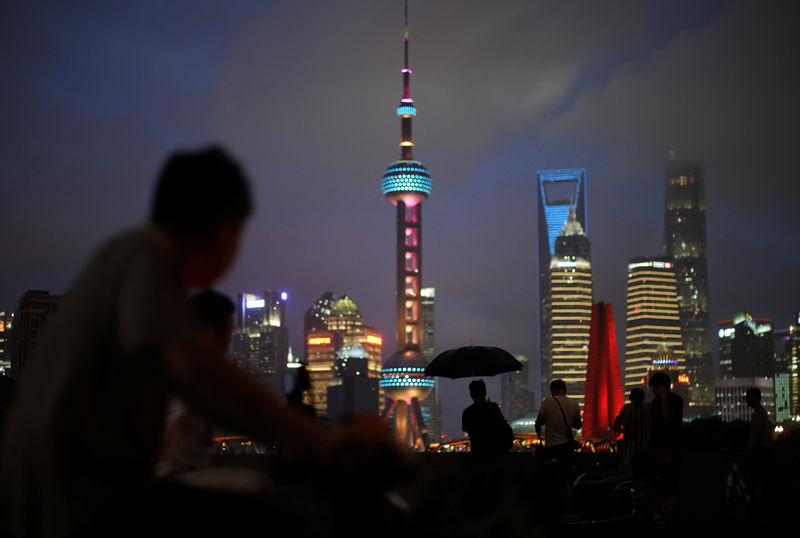By Lusha Zhang and Kevin Yao
BEIJING (Reuters) - China's banks extended more new yuan loans than expected in September, as policymakers ramped up support to stabilize the slowing economy during a bruising trade war with the United States.
Chinese policymakers have been trying to boost bank lending and lower corporate financing costs, especially for the small and private companies vital for growth and jobs, but they have also cautioned against aggressive stimulus amid worries over debt risks.
Separate data on Tuesday showed China's factory-gate prices fell at their fastest pace in more than three years in September, adding to a slew of data in recent months that underline increasing pressure on the world's second-biggest economy.
Consumer inflation accelerated to 3% in September -- the highest since October 2013 -- but analysts attributed this to the supply-side impact of rising food costs, driven by surging pork prices as African swine fever diminishes hog supplies.
Chinese banks extended 1.69 trillion yuan ($238.98 billion)in new loans in September, up from August and exceeding analyst expectations, data released by the People's Bank of China (PBOC) showed on Tuesday.
Analysts polled by Reuters had predicted new yuan loans would rise to 1.4 trillion yuan in September, up from 1.21 trillion yuan in August but largely in line with the tally in September last year.
Banks have boosted lending for the real economy, underscored by a pick-up in medium- and long-term corporate loans, Ruan Jianhong, head of statistics at the PBOC, told reporters. She added that property loans have been slowing.
Corporate loans jumped to 1.01 trillion yuan in September from 651.3 billion yuan in August. Household loans, mostly mortgages, rose to 755 billion yuan last month from 653.8 billion yuan in August, central bank data showed.
Sun Guofeng, head of the central bank's monetary policy department, told the same briefing that the PBOC will rely on reforms to improve policy-transmission mechanisms and help lower borrowing costs.
Sun also said the central bank should manage inflation expectations, although there is no basis for continued inflation and deflation.
Broad M2 money supply in September grew 8.4% from a year earlier, above the 8.2% forecast in the Reuters poll, which was unchanged from August.
Outstanding yuan loans grew 12.5% from a year earlier, quicker than August's 12.4%. Analysts had expected a 12.3% growth.
MORE EASING SEEN NEEDED
Analysts expect the central bank to ease policy further to support growth, despite some signs of easing in trade tensions between Beijing and Washington.
U.S. President Donald Trump said on Friday the two sides had reached agreement on the first phase of a deal and suspended a tariff increase, but officials said much work still needed to be done.
"The upshot is that policy easing is still failing to meaningfully lift credit growth. We think this will ultimately push the PBOC to cut the rates on its lending facilities more decisively," Martin Lynge Rasmussen, China economist at Capital Economics, said in a note to clients after the data release.
China's economic growth in the third quarter is expected to slow to 6.1% year-on-year, just below the 6.2% pace in the second quarter, according to a Reuters poll.
Analysts in the latest Reuters poll expect the PBOC will ease policy further by cutting banks' reserve retirement ratios (RRR) and the one-year loan prime rate (LPR), its new benchmark lending rate.
The PBOC has already cut RRR seven times since early 2018, in addition to two modest reductions in the one-year LPR since August.
Central bank Governor Yi Gang said late in September large interest rate cuts were not urgently needed, following Beijing's reiteration that it would not use "flood-like" stimulus measures.
BOND DEFAULTS RISING
Despite prodding from Beijing, several bankers have told Reuters they have little appetite for lending to smaller companies because of the uncertain economic outlook, the trade war and a years-long drive to purge risks from the financial system. Some companies also say banks are sharply reducing credit lines.
Corporate bond defaults, meanwhile, look set for another record year, though most have been by smaller, private firms.
Growth of outstanding total social financing (TSF), a broad measure of credit and liquidity in the economy, rose 10.8% in September from a year earlier.
The central bank has revised TSF growth in August to 10.8% from 10.7% after a change in the way it calculates TSF.
TSF includes off-balance-sheet forms of financing from outside the conventional bank lending system, such as initial public offerings, loans from trust companies and bond sales.
In September, TSF rose to 2.27 trillion yuan, according to PBOC. It also revised up August' s figure to 2.02 trillion yuan from 1.98 trillion yuan.

Many analysts believe high debt levels -- a legacy of massive stimulus sprees in the past -- are making policymakers more cautious in their stimulus and more tolerant of slower growth as long as it is gradual.